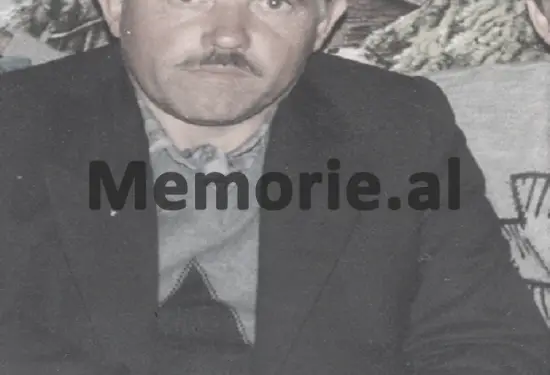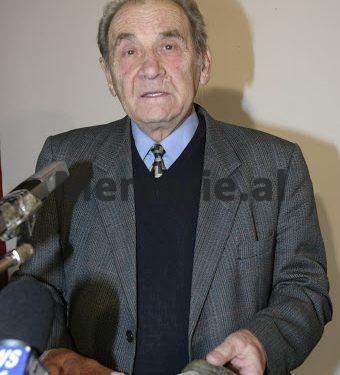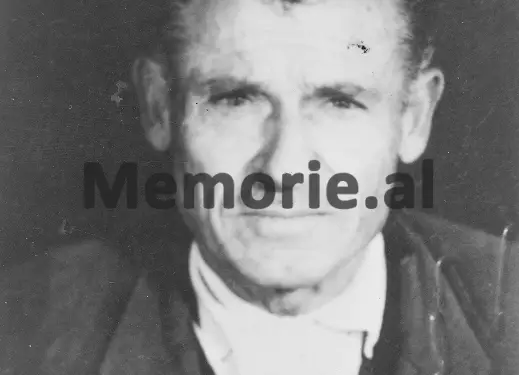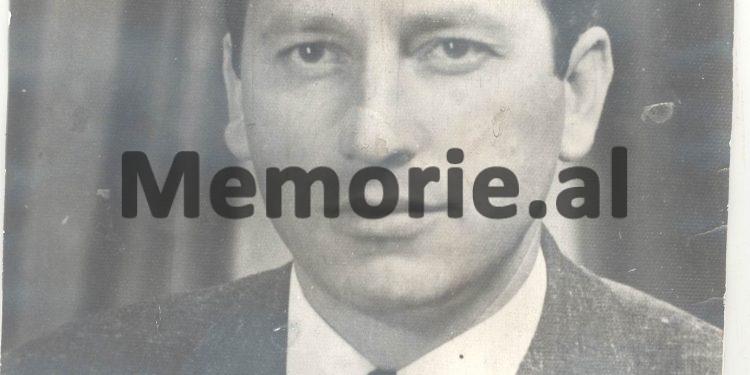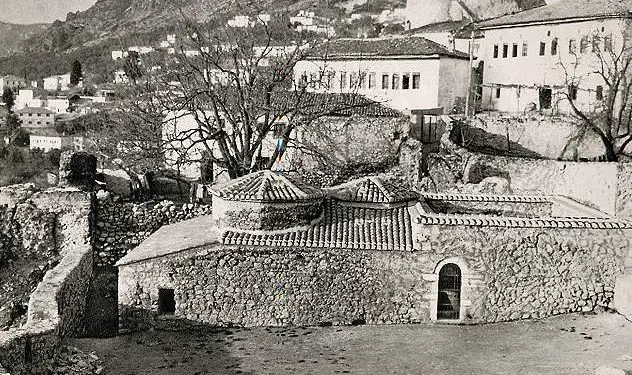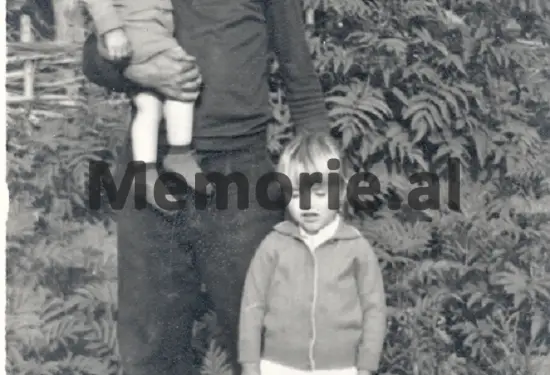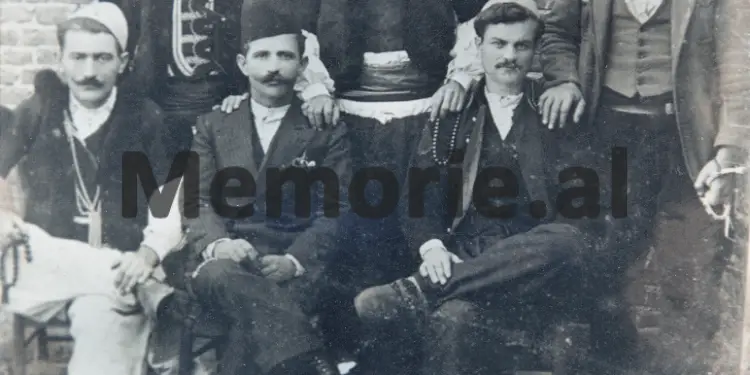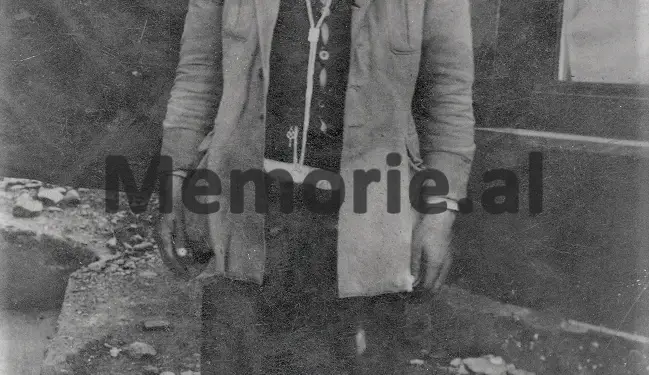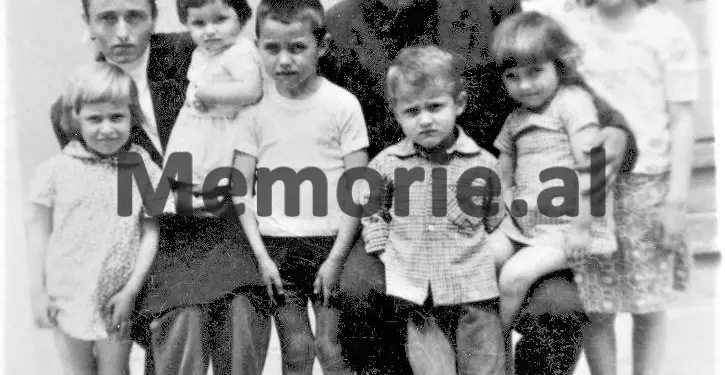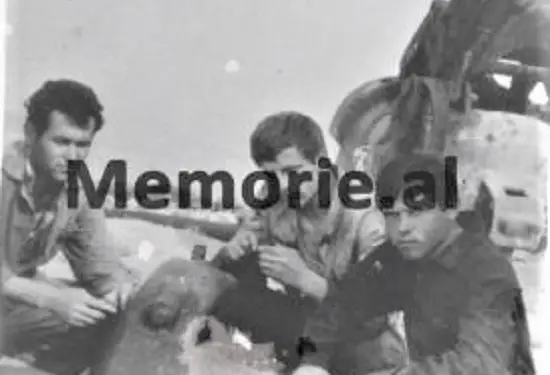Dashnor Kaloçi
Memorie.al publishes the unknown story of engineer Max Uçi, a graduate of Geology-Mining, who in 1972 started working in the quarry of the Cement Factory in Fushë-Krujë, where he became a problem for his behavior and attitudes. it contradicts the “Party line” and for that purpose, a meeting was held to “unmask” it in front of the working collective, which was attended by the first secretary of the Party Committee of the Kruja district. The rare testimony of Sejfulla Tetës from Fushë-Kruja, for the “unmasking meeting” where he was threatened with arrest by the First Secretary of the district, after defending the rebel engineer, who was constantly by the side of the workers, which brought his sentence, transferring him to the Laç city quarry, where he lost his life in mysterious circumstances on New Year’s Eve 1980, the very day he had taken the transfer to Tirana. The magnificent funeral of Max Uçi in Tirana where seven buses with workers from Fushë-Kruja went and where the Prime Minister Mehmet Shehu also attended, as well as the visit of his friends, to the house of Professor Alfred Uçi, were in the presence of all the people who had gone there for consolation, as was Professor Servet Pëllumbi, Sejfulla Teta said: “Your brother was killed by the Security”, as well as the reaction of prof. Alfred, who was taken aback and terrified, told his friends, “This is a benefactor of our family, and he has no regrets about what he said.” How did Sejfulla Teta decide with his friend, Pirro Prifti to throw dynamite at the Yugoslav embassy in Tirana on April 23, 1981, and how does he do that without being dictated by the police and the State Security ?! The subsequent arrest of Pirro Prifti and his comrades from Fush-Kruja, after the attempt to escape from the district of Kukës and Sejfulla himself, who was accused of: “together with a group of intellectuals from Kosovo, such as Shefqet, Estref and Selim Kelmendi, as well as Namik Luci, had made the plan to assassinate the main leader of the Party, Enver Hoxha, during his visit to the Skanderbeg Museum in Kruja ”?!
“After the arrest of Pirro Prifti, with whom I had dropped the bombs on the Yugoslav embassy in Tirana on April 23, 1981, I finally decided to flee Albania. So on the morning of September 29, 1982, while I was preparing to escape, I was approached by the car of the director of the Cement Factory, and I was told to go with them, “to fix an excavator.” I foresaw something and told those who asked me to: walk before I was walking after them. As soon as I got out on the national road, where Shote Galica’s headstone is located, two cars stopped at my feet. One of those who came out of them was Sadik Smaja, the crime boss of the Kruja district, who immediately threw himself on my neck, saying: ‘Have you remembered that life is an adventure’ ?! After they put the irons on, they put me in the car and immediately took me to the Internal Affairs Branch of Kruja, where the Deputy Chief Investigator Nexhat Selimi told me: ‘We have arrested you, because you wanted to kill the main leader of the Party with the assassinations. ‘. I was surprised by those words and instinctively asked him: ‘Who, Enver Hoxha?’? Still, without finishing his speech, at the height of his nerves, Nexhat Selimi told me: “Don’t mention his name, you got dung, you got dirt”, and he raised the rubber stick to shoot me. I couldn’t stand it and said, “That’s how Sejfulla Teta from Fushë-Kruja remembered his first arrest, who testifies exclusively to Memorie.al, confessing to all the vicissitudes of his life.” But who is Sejfulla Teta, what is his past and when did the dissatisfaction with Enver Hoxha’s communist regime arise for the first time? How did Sejfullai get to know Max Uçi, the brother of Professor Alfred Uçi, the engineer who had graduated abroad, and why did Max speak to him against the communist regime? Why did the First Secretary of the Kruja district threaten Sejfulla with the arrest at the meeting where Max Uçi was being unmasked and the mystery of the accident that took the life of the rebel engineer in the city of Laç, on New Year’s Eve 1980, exactly the day he received the transfer to Tirana ?? Why did Sejfulla Teta publicly accuse the State Security of killing Maks Uçi at Alfred Uçi’s house and how did the well-known professor protect his brother’s close friend, in commemorating the six-month anniversary of his death? What were the reasons that pushed Sejfulla Tetë to plant bombs at the Yugoslav embassy in Tirana and who was Pirro Prifti, his accomplice in that action? How was Pirro Prifti arrested during the escape attempt and how did the State Security drive him into the investigation cells while awaiting the death penalty? Who were the five intellectuals from Kosovo who were accused of wanting to assassinate Enver Hoxha during his visit to the Skanderbeg Museum in Kruja? What did the investigator Nexhat Selimi ask Sejfulla and who was the provocateur who put him in the cell? What they talked about for seven hours in the cells of Kruja, on January 1, 1983, the Minister of Interior, Hekuran Isai with Sejfulla Teta and why he did not accept the accusation made against him, at a time when his “collaborators”, originating from Kosovo, they signed it during the investigation ?! Why did the trial that sentenced the four “assassins” of Enver Hoxha to death last eight days and why was it filmed with TV cameras? How was the life of Sejfulla Teta and the three members of the “group”, and the machinations of the State Security, to clash with each other in the galleries of the Qafe-Bar mine? What were the reasons and the enigmatic death in the prison of Burrel, Selim Kelmendi, one of the “assassins” of Enver Hoxha, after the letter he sent to Ramiz Alia? Where did Sejfulla Teta serve her sentence and why was she released with the last political prisoner in March 1991? For all these events and other facts of his life, we know the exclusive interview of Sejfulla Tetës, which we are publishing below starting from today’s issue.
Mr. Sejfulla, where were you born, and what is the origin of your family?
I was born in 1949 in Fushë-Krujë, where our family originates from and where I still live in the lands of my ancestors. My father was named Ahmet Teta, but my uncle, Ali Teta, who was one of the most famous men in the Fushë-Krujë area, took me and raised me. Ali was one of Abaz Kupi’s closest friends and his personal bodyguard during the war.
What about after the end of the war where your family members worked?
After the end of the war, my father, uncle, and everyone else worked in the cooperative. Only one of my uncles, Ramadan, worked on the construction until he was found murdered in his home on December 31, 1952. His murder remained an enigma for many years. But in fact, he was killed by the state in order to keep our family under control.
When did you learn the truth about your uncle’s murder?
I learned the truth of the murder of my uncle, Ramazan, from State Security, by chance in 1966, when one of the people who had taken part in his murder had confirmed it in a drink.
After you learned that thing, what did you do?
In 1981, when I was working as an excavator at the Kruja quarry, I took dynamite and at 12 o’clock at night I went to the town of Mamurras to the house of the one who had said that he had taken part in the murder of my uncle, with the surname…. The dynamite blast caused only material damage and shattered many windows in the city. In fact, I didn’t want to kill anyone, but just to show that person that we were alive.
Did you dictate the setting of dynamite?
Not for many years, no one dictated to me.
When did you first start working and where did you work?
I started working in 1966 when I was no more than 17 years old. At first, I worked as an assembler, mechanic, and then for many years as an excavator.
The first grievances against the communist regime of that time since they were born?
Since the assassination of my uncle in 1966, I no longer loved that regime. Dissatisfaction began to increase even more when I started working with political prisoners at the Cement Factory. There I met Bedri Spahiu, and many of whom I felt sorry for the way they were treated.
What about in the following years did you talk to anyone against the current regime?
One of the people who spoke to me for the first time against the regime was Max Uçi, the brother of Professor Alfred Uçi, whom I first met in 1972 when he was brought as a geological engineer to the Kruja quarry. I worked. Max had graduated abroad and he had Western culture. Max loved the workers, and he could not stand the injustice done to them by the administration. Maxi often told us that: ‘productivity at work was achieved by advanced technology and not by manual labor’. In all the conflicts between the workers and the administration, Maxi sided with the workers, so the directorate began to notice him. During a quarry, Maxi said: “Workers were paid very little, so they could not be required to do much work.” From this position, the directorate organized a meeting to unmask it, which was attended by about 400 workers. During the meeting, Maxi had a debate with Ymer Limanaj (second secretary of the Kruja District Party Committee), who had come as a delegate. I was in the first place and they told me to get up and talk about how I knew engineer Max, in a word, to give him a biography.
Did you get up and talk?
I stood up and said, ‘What biography should I give to this one when this is the grandson of Petro Nini Luarasi, the grandson of ABC. He went to school abroad and the biography was made by the Party. After I spoke like that, I went on to say, “Max was protecting the workers and fighting the swindlers.” At this time, the second secretary asked me who the swindlers were, and I told him that ‘they were the party secretaries who would not let you work, mentioning the party for an hour’. After that, the first secretary of the district who came there, threatened me, saying: “There are places for arrests here.”
How did that meeting end?
They wanted to arrest me, but they transferred Max to the Laç quarry. After working for six months in Lac, Max was transferred to go as a specialist in the Ministry. On New Year’s Eve 1980, after making the deliveries, he received his salary and sat down with two friends to drink a glass and rent them out when he left. But he could not return to Tirana, as he was found dead on the national road (at the chrome scale) at the exit of the city of Laç. According to the police, he was hit by a car from Kukës, which had left without help and his body was left for several hours in the rain, right in the middle of the road. As soon as the news of his death was announced, my brother, Rizai, went first and took his body. Max was given a grand funeral in Tirana, attended by Prime Minister Mehmet Shehu. From Kruja alone, seven buses with workers went to his funeral.
Aside from the police version, how was Max Uchi’s death rumored then?
Everywhere in the population at the time, it was said that Maxi had been killed by the Security, and in order to dispel suspicions, a large funeral had been held for him. On the occasion of the six-month anniversary of Max’s death, Selim Alikon, a geologist, and I went for a coffee at the house of our brother, Professor Alfred Uçi (behind the Natural Sciences building), where I remember people being Servet Pëllumbi. At one point when it was quiet, I said to Alfred: ‘More, what about Max’s work that remains an enigma. What do you know’?! Alfredi told me, “You know who worked with him more than I know I have a brother.” I replied, “As long as this work remains an enigma, it has been killed by the Security.” After that, Alfred immediately stood up and addressed those who were at home, saying, “This is a benefactor of ours, and it is not worse for him to say these words.” Alfred wanted to protect me since most of the people who had come there were Security. The words I uttered there were also mentioned to me when I was arrested in 1982.
Before we came to your arrest, after the death of Max Uchi, did you talk to anyone else against the communist regime?
My hatred for the communist regime in power began to increase, and it peaked in 1981 when our family’s economy was collapsing. So I did not hesitate to speak and express my dissatisfaction in a close circle, were among them was a young boy, about 23 years old, named Pirro Prifti, originally from Piqerasi, who worked as a worker in the Enterprise of water. His father was a mechanic and worked with me, while Pirro came to me because he wanted to make a trade, but he was not allowed to do so and was left a shovel worker. Pyrrhus did not have a bad biography, as his mother had been partisan, but he himself had gained a great deal of hatred towards the regime. So, along with Pyrrhus and some other comrades, I was constantly speaking out against the regime. In that group of friends, during a conversation there in the quarry, we decided to take the dynamite and throw it in the foreign embassies that were in Tirana.
But for what reason did you decide to throw dynamite through the embassies?
During our conversations there in the quarry, someone said that even the foreign embassies that were in Tirana were to blame for the bad situation in Albania, as they did not raise their voices in their countries anywhere in the world, to show how Albanians lived and how they were oppressed. That was the reason we decided to drop the bombs. But we didn’t want to kill anyone with those bombs that we were going to drop, as our goal was just to make noise. Pirro was the most prepared of them all, so I decided to drop the bombs on him.
How did you plan to drop the bombs and how did you accomplish it?
At first, we decided to fill a van with dynamite and bring it closer to the prime minister’s office in Tirana, but that was only in the context of words. Then I just talked to Pyrrhus and we said let’s start with the embassies. So after we made the plan, we took two halves of the plum, and there, from April 22 or 23, 1980, we went to Tirana by bus from the Fushë-Krujë line. That day in Tirana there was a football match for our representative with a foreign team (Germany seems to me) and it was raining. Pirro and I, after getting off the bus from Fushë-Krujë to Zogu i Zi at around 20.00, walked along Durrës Street, came out close to the center with the thought of throwing the bombs we had with us at the Cuban embassy…
But why didn’t you throw them there?
We did not throw them there, as the place seemed open and inappropriate, we were afraid they would catch us. So we decided to go back to the Yugoslav embassy, and inside we saw that there was a lot of movement and noise. When we got there, Pyrrhus told me that: after we threw the dynamite plumes inside the embassy, we would go in and climb the stairs to the palace next to the embassy wall, where he knew a girl. And if someone asked us, we would say we were going to ask him to be engaged to Pyrrhus. So we, as soon as we entered the entrance of the palace, threw the dynamite plums which made a very loud noise. After that, Pirro climbed the stairs of the palace to enter the girl’s house, and I hurried away from Durrës Street towards Zogu i Zi.
After throwing dynamite at the Yugoslav embassy and heading towards Zogu i Zi, along the way, was you in danger of being dictated to by the police?
No, I was not in danger of being dictated to, because I ran away and no one saw me. In those moments there on Durrës Street, there were not many people, because as I said it was raining lightly and the road was almost empty. Likewise, until I arrived at Zogu i Zi, I did not see any police foot.
What about your friend Pirro Prifti, didn’t he follow you?
No, he did not come after me but entered a palace very close to the embassy, where we lit the dynamite before throwing it, and as I said there he knew a girl. Pirro had many such connections at the time, as he was a very handsome boy.
After you went to the Black Bird, where did you go next?
When I went to Zogu i Zi, I stayed at the station where the bus from the Fushë-Krujë line was stopping and with that bus I traveled to my house in Fushë-Krujë ”.
Based on the event that took place in Tirana, along the way, were there any police checks?
No, the police did not stop us, as the police notifications had not been made yet, but as I learned a few days later, after the bus with which I had traveled, frequent police checks on the streets had begun.
When you went home, did you talk to anyone about what you had done in Tirana?
When I got home, the Albanian Radio-Television was giving the news of the bombing of the Yugoslav embassy. I said to my uncle, Ali Tetës: “How did you say or uncle, who would have put the dynamite there, you Yugoslavs” ?! My uncle looked at me and said, “We are the ones who hate the government because they are very boring and they are not letting us live like slaves.” To avoid doubts about my uncle, I did not prolong it, but I turned my back on him without looking him in the eye and went to sleep in my room, as I was married and had children at the time. So that night I slept peacefully without being disturbed at all.
When did you meet your friend Pirro Prifti and what did you talk about?
I met Pirro after a couple of days there in the Kruja quarry and he said to me: Why should we cling to these basins ”?! Pyrrhus was very concerned about what we had done and asked me at all costs to run away.
How did you react to Pyrrhus’ suggestion to flee?
I told Pyrrhus to think about it and see and do. But to be honest, I didn’t want to run away because I was married and had children, and I knew what awaited them after my escape.
How did Pirro act afterward, did he try to escape from Albania?
Pyrrhus had lost his mind and he talked to some other friends to escape, who were quite ready. So in those days, he found a boy from Kukes, who undertook to accompany them to the border. After that, together with 6-7 of his friends from Fushë-Kruja, such as Lut Kelmendi, Kujtim Doku, Fatmir Daci, etc., they left in a car in the direction of Kukës. When they arrived there, in the middle of the city, they saw a boy from Fushë-Kruja, who worked as a Security officer in Kukës, as an Operations Worker. As soon as he saw them, he told them: “Oh, after all the Fushë-Kruja landed here in Kukës”. After those words, they were afraid that he would report them to the police, and after hiding in a garden, the rifle they had with them, they returned to Fushë-Krujë. They told me all this one day after they came to Fushë-Krujë, and I told them, “You have been very stupid, you have not escaped, and you have returned. Why did you wait to get permission from the Interior Ministry to escape? After two months, they arrested them all along with Pyrrhus. During the investigation, they had treated them very badly, torturing them and introducing them to electro-shock. After that, they were forced to tell him everything they had done.
But after the arrest of these, were you not afraid that they would tell about you too?
I had no doubt that they might take me out too, but I had made up my mind to say I knew nothing about them. So with that in mind, I decided not to run away from Albania. But I wanted to add that: after the arrest of Pirro Prifti and his comrades, the State Security arrested another group of four people, accusing them of being “agents of the Yugoslav UDB, who wanted to assassinate the leader. the highest of the Party, Enver Hoxha ”. All four of them were intellectuals and of Kosovo origin, such as Selim Kelmendi, Estref Kelmendi, and Shefqet Kelmendi. superphosphate. At the time after their arrest, many things were rumored, saying that they were the most dangerous group ever discovered by the State Security, after that of Mehmet Shehu. I mentioned this group because when I was arrested on September 23, 1982, the investigator accused me and considered me as one of the main members of that group./Memorie.al
Follows tomorrow




